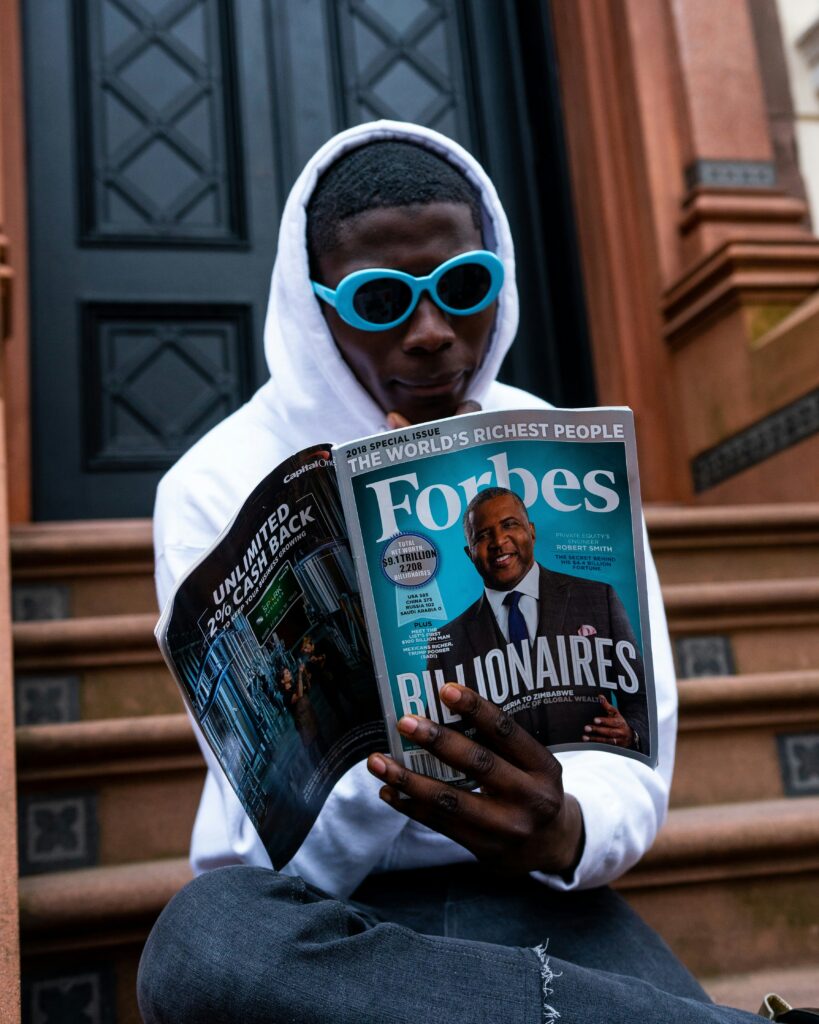
Photo by David Suarez on Unsplash
I know, I’m silent on the writing front for six months and then come back to tell you that you’re never going to be rich.
Long story short, I was dealing with the U.S. medical system and being a caregiver. It felt like I aged forty years in two months and while that may have been the reason for my absence, it’s not what sparked the disgruntled old man energy coming at you now.
That gaseous cloud is thanks to an aged blend of reality, wealth inequality, and statistics.
Let’s! Dive! In!
What is “rich?”
There may not be a firm number that “rich” officially refers to, but it comes with the connotation of having a large amount of monetary wealth. Whatever amount that is, it is plentiful enough to feel safe, secure, and protected from any financially detrimental events. Untouchable from the woes of ordinary folk – generally a millionaire if not billionaire thanks to the ever-growing wealth gap.
Becoming rich is often tied to the “American Dream,” and the idea that success is inevitable via hard work. Richness is portrayed as an attainable reward instead of the unlikely outcome that few will experience if not inherently playing in the pool of elites aka they are not someone who is born into wealth.
Even if not explicitly told that “rich” is what you should aspire to be, it is ingrained in us through culture that glamorizes consumption and idolizes wealth. There is high status associated with luxury goods, we are bombarded with extravagant franchises like “The Real Housewives,” and from a young age we play games such as M.A.S.H. aka Mansion, Apartment, Swamp, House (hi, hello, millennial here).
By simply existing, we absorb the fact that being rich makes life a lot easier.
The disconnect
Because we are soaked in “don’t you want to be rich?” soup, it’s unsurprising that becoming wealthy is an aspiration shared by many. What is bewildering though, is the rejection of the impossibility of becoming rich despite there being recognition of the extreme difficulty of its achievement.
According to the 2024 “Americans and Billionaires Survey” from the Harris Poll Thought Leadership Practice, 60% of American adults want to become a billionaire one day even though 70% of them believe wealth inequality is a serious national issue.
The Harris Poll’s 2022 “Americans & Billionaires Survey” revealed that 44% of American adults believe they have the available tools to become billionaires, with the confidence of those who are crypto investors jumping to 71%. It also reported that 66% of Americans believe that economic inequality is a serious national issue and nearly half (46%) of them believe that billionaires make it harder to achieve their American Dream.
In case the mention of self-assurance among crypto investors didn’t make it apparent, the disconnection between our desire to become rich and the plausibility of it makes us delusional.
(FYI this clip from Last Week Tonight is a good reference for further insight into the paradox).
The façade
Billionaires are portrayed as gaining riches through their genius, innovation, and extraordinary abilities; the living proof that ambition and talent lead to success. This ideology twists wealth into a representation of personal attributes and resourcefulness, which then causes us to dismiss our slim chances of becoming rich.
If the power to transform ourselves into supposedly well-deserved icons of prosperity lies within our own characteristics and choices, admitting that it will not happen makes us feel flawed, incompetent, and unremarkable.
Being rich, however, is not a reflection of an individual’s traits or worthiness.
Billionaires are not superior or exceptional people.
- Elon Musk stated “I am the alpha in this relationship” to his first wife as they danced at their wedding reception (what everyone in a safe and loving marriage wants to hear).
- Warren Buffett eats McDonald’s for breakfast each morning and drinks at least five 12-ounce servings of Coca-Cola every day – truly something only a billionaire with high-class healthcare could do and still live into his 90s.
- Mark Zuckerberg (with the help of T-Pain) recorded an acoustic version of Lil Jon and the East Side Boyz’s song, “Get Low,” as an anniversary present for his wife, ruining music for everyone.
In addition to their most unique qualities being frightening rather than innate magical moneymakers, billionaires are not the outcome of a “pull yourself up by your bootstraps” methodology. They are often the result of inheritance and hoarding familial wealth.
A 2021 Institute of Policy Studies report on American wealth dynasties concluded that 27 of the top 50 richest families on Forbes’ 2020 Billion-Dollar Dynasties list were already represented on the magazine’s list of 400 richest Americans in 1983.
These families have not just maintained their wealth over the years, they have significantly increased it. Cosmetics magnate Estée Lauder and her descendants have seen their wealth grow from $1.6 billion in 1983 (in 2020 dollars) to $40 billion in 2020, a growth rate of 2,465%.
Unless you are part of one of the 50 wealthiest billionaire bloodlines, you are likely among those of us clamoring for their leftovers.
The IPS report found that in 2020, America’s 50 wealthiest billionaire family dynasties together held $1.2 trillion in assets. By comparison, the bottom half of all U.S. households — an estimated 65 million families — shared a combined total wealth of just twice that, at $2.5 trillion.
We are living in what has been referred to as the second Gilded Age.
If not “rich,” then what?
Accepting that you will never get an invitation to the big boys’ billionaire club is not defeat, but cognizance of the world we live in.
Stepping out of a fantasy of inevitable riches allows you to clearly see the differences between you and the ultra-wealthy. Embrace the inequality and get mad.
Working full-time should not mean you can’t support yourself and your family. Bare necessities should not erode or exceed your pay.
Jeff Bezo’s earnings equate to $8,961,187 per hour. That’s roughly 315 times Amazon’s $28,466 median annual worker pay. An Amazon worker earning the $15 minimum wage would need to work about 597,412 hours, or 24 hours a day for about 68 years, just to earn what Bezos makes in one hour.
Bezos and the billionaires like him never have to worry about a single expense yet are the ones determining if those with far less can afford anything. It feels as though we are at their mercy, but the same system that enables their endless spawn of wealth answers to you too.
1% hold most of the wealth, but 99% aka a lot more people have the ability to make them share.
The larger the wealth gap grows, the more individually focused we tend to become because we are consumed with struggling to survive. The key is to remember that we are not alone. We are part of a community and collective action is powerful.
Vote for the people fighting for child care, healthcare, elder care, and every other currently catastrophically costly human need to become a human right. Remember how much of the wealthiest people’s earnings are dependent on your labor and understand the importance of unions. The U.S. Bureau of Labor Statistics found that nonunion workers in 2024 had median weekly earnings that were 85% of earnings for workers who were union members ($1,138 versus $1,337).
(I get that all of this sounds preachy, but again, this is the system we live in).
“I would rather earn 1% off a hundred people’s efforts than 100% of my own efforts,” is a quote ascribed to John D. Rockefeller and a precise summary of how the rich are extorting everyone.
Acknowledging that you are never going to be rich means you are ready to stop getting played.






